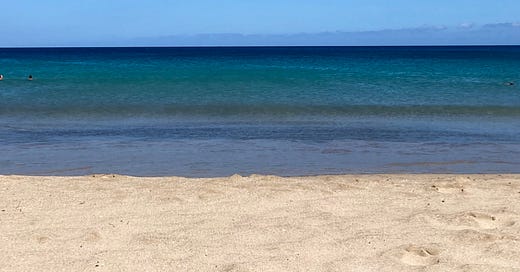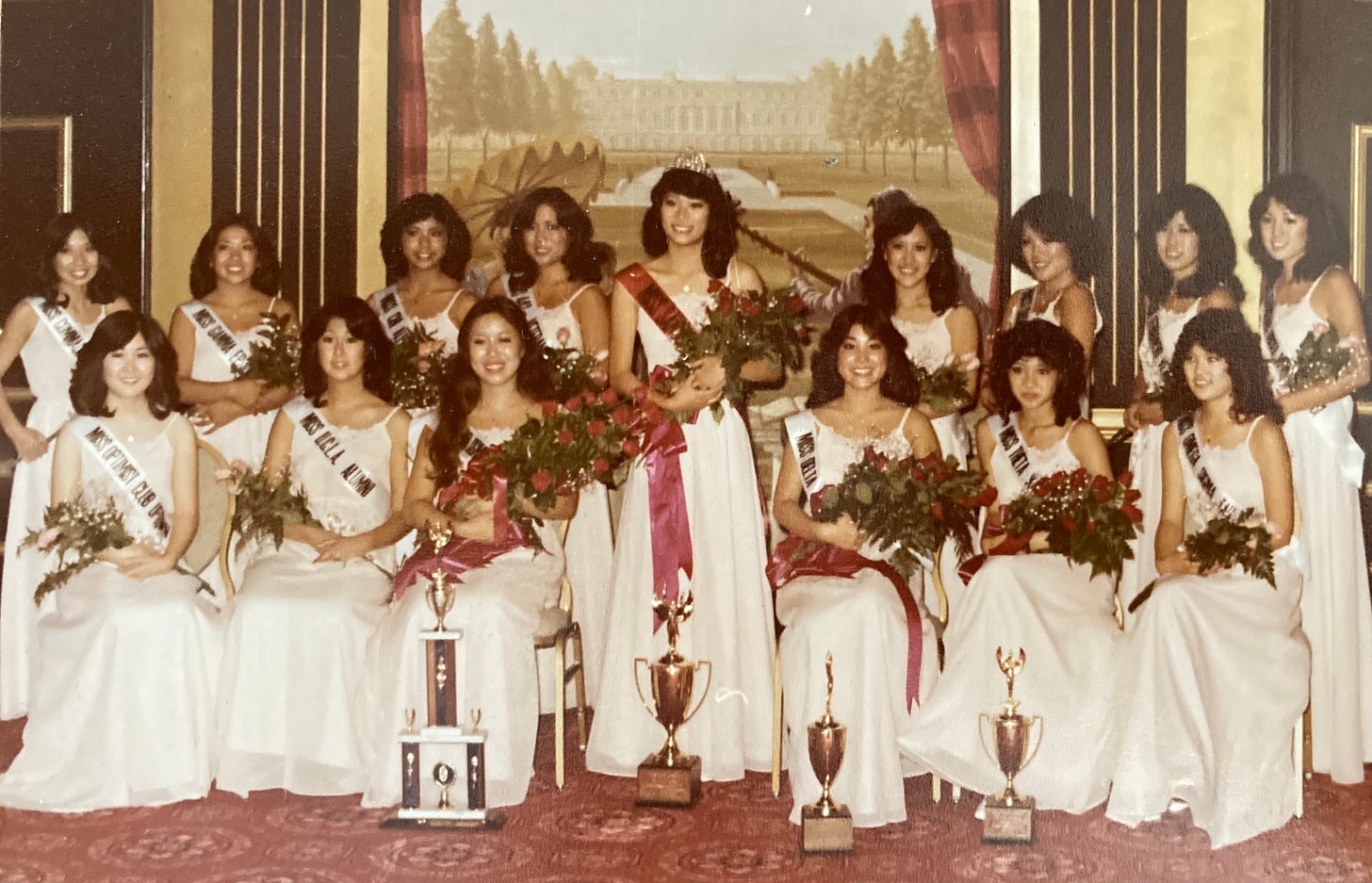About fifteen years ago, I was caught off-guard and swept into a new reality, discovering I was (and still am, Happy Pride!) queer. Queer as in (for me) same-gender loving.
This helped me to make sense of my life, looking back to the predominance of times I felt diagonal, different—spiritually, creatively, socio-emotionally, vocationally, and in so many other ways.
But wait. Before this latter life-syncing happened, I left the prelude to a family reunion and while others golfed, I drove myself to Hapuna Beach and entered her waters. I was struggling with plans my former spouse and I had to separate, alongside this deeply personal awakening I was undergoing, that felt beyond my beckoning or control.
As I walked into Hapuna, I heard someone say to me, “Where have you been?” I looked around to my left, to my right and behind me, and no one was there. It was a voice that felt both inner and outer all at once. It was a calm adult female voice, absent of all anxiety or judgment. I have heard Her voice here and there ever since. She always feels, in my body, like an equanimous, supportive nudger with unforced, natural authority and internal logic. Perhaps She is Wisdom. Sophia.
Where had I been?
Let’s travel back some thirty years or so before that oceanic baptism.
*
Run for the Roses (first pub. 1996 in Voices in the Night, Under the Rug Press)
The first time I wore false eyelashes, a padded bra and white pumps was when I ran for “Miss Teen Sansei of California.” I was seventeen, and it was 1979. Two of my closest friends had already done so in the preceding years, and it just felt like it was my turn. Like piano, basketball, softball. Batter up.
Before I go on, may I first say that this group of young women included some of the most kind, smart, funny, resilient, sweet, street-wise and lovely people I got to meet at that time of my life. So this is not about them. We were each there as representatives of some kind of invisible lineage. I can only speak to mine.
The queen and her court would get to walk around in happi coats, sashes, and of course white pumps at the Crenshaw Carnival which happened every summer. The winner got to go to Japan (I think), and maybe won scholarship money. Mostly she got to be queen. We all had our pictures in the Rafu Shimpo. And the race began.
We practiced every week inside Sumitomo Bank in Crenshaw Square. We learned how to walk and talk. I thought I’d mastered that pretty well, but apparently not. This Japanese American lady who’d been a Dean Martin Golddigger was our instructor. She was beautiful and talented. She had succeeded.
We learned to speak our names and those of our sponsors, “My name is Colleen Tani, and I represent the Westside Optimist Club.” Our pumps clicked on the tile floor of the bank as we practiced, in our tee-shirts and shorts, walking down an imaginary ramp—smiling, head up, shoulders back, tummy in, butt under, toes pointed straight ahead. Try to make those daikon legs look long and slender. Our instructor told me my right arm swung a lot more than my left. Now I think, “Hey lady, swing This.” Though wasn’t she too a product of a commercial industry imprinting itself on our impressionable bodies?
At our makeup lesson, we learned how to make our eyes look bigger, and how to accentuate the noses, cheekbones and lips that none of us were born with. The implicit message was that naturally Asian was insufficient. Eye shadow, eyeliner, false eyelashes. All this not only to look more . . . American . . . but to look like we would never age. Disturbingly a little like that pucker-up-for-daddy look. But in a classy kind of way. After all, we were talking about the pageant that would be held at the Beverly Hilton, with Mario Machado as emcee, in a tux.
The pageant was a big community event, a strange kind of celebration. Guests came dressed up and tickets were expensive. Someone once said it served as a fundraiser for a Japanese American group of the Republican Party. The James Clavell Award was given, and every year we were so honored that Tippi Hedren was one of the celebrity judges.
James Clavell was an Australian-British-American novelist, specializing in “Asian sagas.” It would’ve been so strange if the award in his name was presented to an Asian American writer. Racism has so many weird tentacles, just ask anyone at the receiving end.
In addition to starring in Hitchcock’s “The Birds,” Tippi Hedren was also a model. No one really explained to us why she was there. Back to the essay, Coke.
There were fifteen of us. I was third from the shortest. We did two walks, first in our happi coats in the formation of a “T.” I didn’t do my “T” right. Then in our evening gowns, we walked an imaginary rectangle. Each of us had to answer an “impromptu question” that Mario first asked before pointing his mic at whoever’s turn it was. This was a test of looking pretty and thinking on our feet at the same time. The ultimate test in cultural competence? I don’t remember my question. I do know my answer came out fine. I’m sure it was loyal, compassionate and within the lines. That part of the training came 1-2 generations before, circa WWII, behind barbed wire.
Of course Lisa won. We knew she would. She was poised, confident, and had that Pearl Drops Tooth Polish smile. She was tall and thin. She had gone to modeling school. We did a photo shoot, with the court gathered around Lisa. We all wore our peach gowns, sashes and pumps. On the count of three, we smiled.
The next weekend we walked around together at the Crenshaw Carnival. And in August we rode on a dedicated float in the Nisei Week parade. I learned how to wave like a princess, it all came from the wrist. My hand turned side to side like a motorized doll.
*
Twenty-four years later, I started to come through. Different group pic. Different individual moment. These were from a reading of emerging BIPOC writers at the LA Times Festival of Books in 2003:
I started to come through in lots of ways after my dear dad passed away. Sometimes I think kids, or at least the sensitives in a family, know when parents have borne great suffering. And, being kids, we overestimate our sense of responsibility for possibly tipping them into the realm of too much suffering. I think this is what I did; I spent a lot of years trying so hard to do the opposite of tipping my dad into further pain or adversity. So I stayed—no, I tried to excel—within the lines of acceptability etched into our lives by systemic trauma. Not just the mass evacuation and internment, but its unwitnessed aftermath.
After my dad passed away, I became a PEN Rosenthal Emerging Voices Fellow. I traveled across the country to study text & movement with the Liz Lerman Dance Exchange. I played taiko drums until my body synced up, echolocated and told me who I was. I took myself to Hapuna Beach.
I once heard the poet Mark Nepo say something like, “We often think our spiritual journey is from point A to point B. No. Just look at the natural world. Our journey is from inner to outer, toward the light, toward becoming fully expressed.”
I went back to Hapuna two weeks ago. She has changed some, and so have I. But we still speak Ocean to each other. We still speak Body.
*
For you,
Coke









Love your writing Coke! Interesting, accessible u multi-layered.
i feel joyfully welcomed in. Thank you.